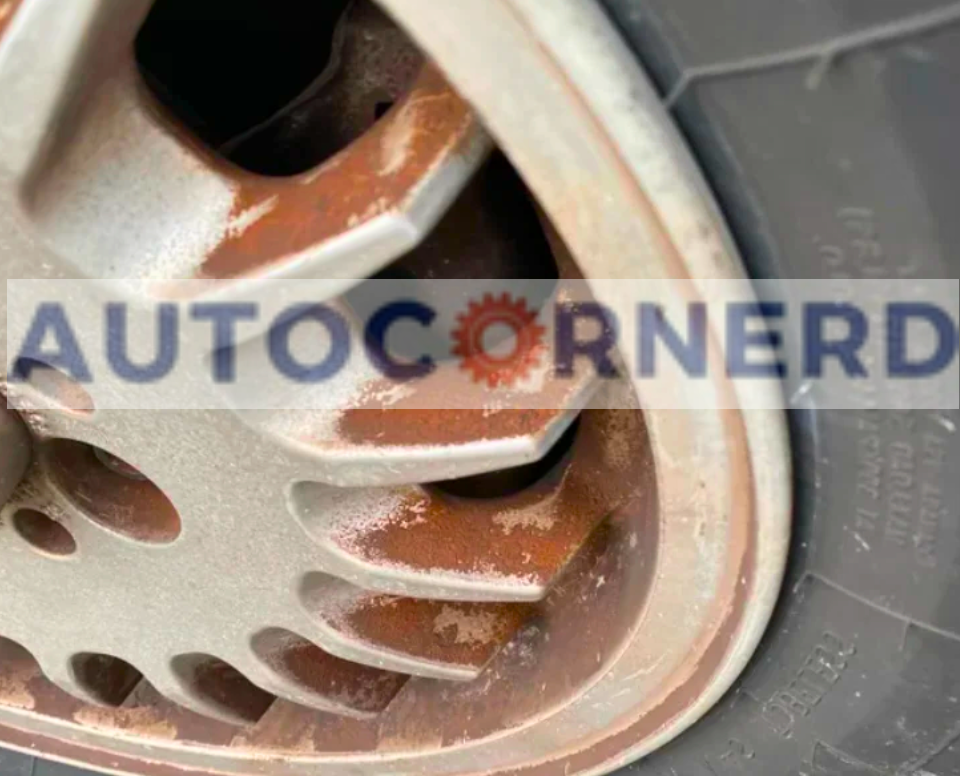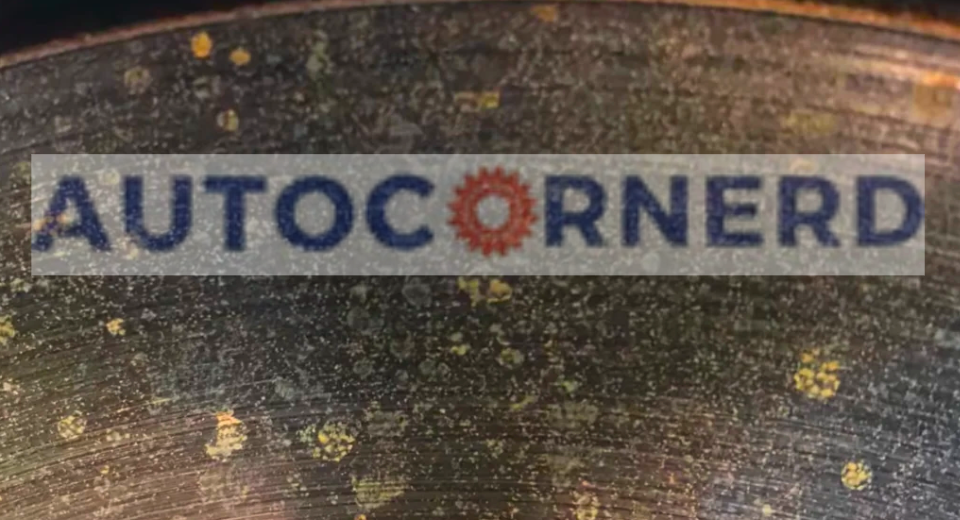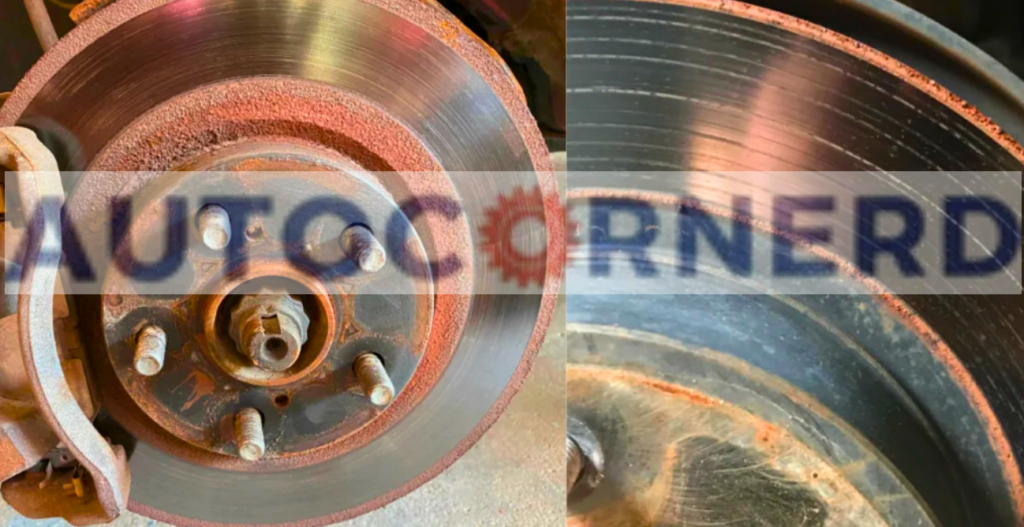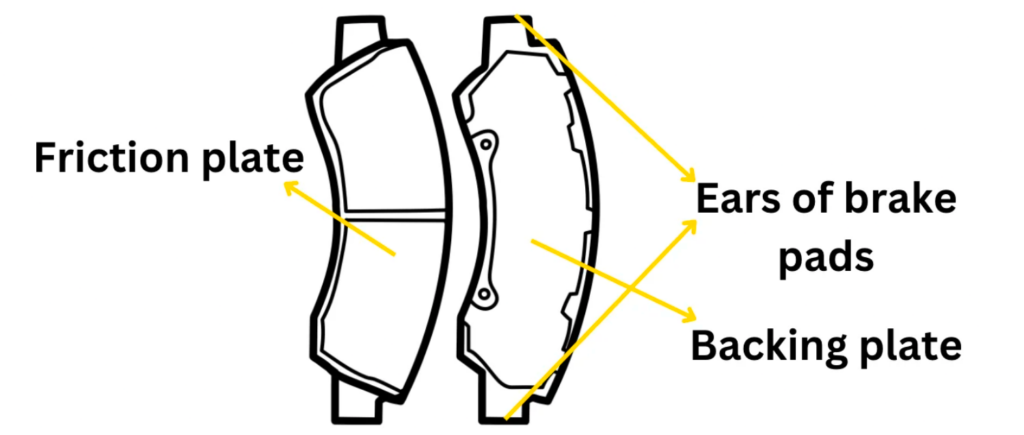What is Causing My Brakes To Squeak When Stopping Slow?
The high-pitched vibration of brake pads at when braking slowly is the cause of brakes squeaking when stopping slow. The level of vibration is affected by moisture buildup and dust layer on brakes. Brake dust buildup and moisture also causes brakes to squeak, especially at slow speeds. Rust forms from condensation, leading to squeaking when you slowly apply brakes. Worn brake pads cause metal backing plates to contact rotors, resulting in brakes squeaking. Cold brakes squeak due to improper seal between pads and rotors. Warped rotors also cause brakes to squeak and vibrate when slowing down.
The brakes on your car make an irritating high noise when you stop gently. This squeak happens more when braking slow, not hard stops on the highway.
No need to worry – this issue is common. Knowing what makes brakes squeal can help fix it. Here we’ll look at why brakes squeak and how to stop the noise.
If you want to get a quick answer, you can also chat with a virtual mechanic for free.
In the last section, I’ve included comments from forums where users share firsthand experiences of brakes squealing when stopping slowly. Be sure to check out that section for real insights.
Before proceeding further, I would highly recommend you having a brief overview of each component of a disc brake. It will help in troubleshooting brake-related issues easily. I have explained the working of disc brakes with a proper diagram. So, please visit the link and check that out.
For you, I’ve developed an interactive tool to aid in troubleshooting automobile issues. It walks you through straightforward steps. Don’t miss out on using it.
- Brake dust buildup and moisture causes high-pitched brake squealing when stopping slowly. Cleaning and drying brakes prevents this.
- Rust forming from moisture also makes brakes squeak, especially when first applying brakes. Driving briefly before braking prevents rust buildup.
- Warped brake rotors vibrate against pads, causing friction squeals. Resurfacing or replacing rotors fixes this.
- Improperly broken-in new brake pads wear unevenly, causing noise. Properly heating up and cooling down new brakes prevents this.
- Lack of lubrication and anti-squeal shims allows pad vibrations causing noise. Lubricating and correctly installing shims prevents squeaking.
What is My Personal Experience With Brakes Squeaking At Slow Speed?
My cousin drives an older Mitsubishi Lancer that recently developed an irritating high-pitched brake squeal when stopping at low speeds. I inspected the brakes and noticed a slight warp on the front brake rotors along with some built up rust.
Using an orbital sander, I resurfaced the rotors just enough remove the uneven spots. Then I scrubbed off the rust thoroughly with brake cleaner and steel wool. After reinstalling the freshly cleaned rotors and pads, the brakes were smooth and quiet once again during my test drive around the block.
What are the Causes Of Brakes Squeak When Decelerating Slowly?
Here are the causes of brakes squeaking and vibrating:
1. Buildup Of Brake Dust On Rotor Causes High Pitch Squeaking

Brake dust is a mix of tiny metal pieces and sticky stuff. It builds up on brake pads and rotors as they wear down from rubbing together.
When you step on the brakes, the pads squeeze the rotors. This makes heat and rubbing that slows your car.
After some time, the constant wear and tear can make bits of metal and stuff flake off from the pad and rotor surfaces. These bits then stick to the area and make a layer of brake dust.
With brake dust, the bits can pile up on the pad and rotor surfaces. This makes an uneven layer that can stop the brakes from working smoothly. It can make the brake pads shake in a way that makes a loud squeaky noise when you stop.
How to fix brake dust on wheels?
To really get rid of the squeaky brake noise and clean off the built up brake dust, using a garden hose and a brake dust cleaner together works well.
It’s important to pick a non-toxic brake dust cleaner, especially if the rims or finish need gentle care.
For a good, affordable choice, P&S Brake Dust Cleaner is a foam cleaner that floats the brake dust up off the foam.
To start, make sure the brakes have cooled off first. Then, spray the brake dust cleaner onto the wheels and brake caliper, getting the foam onto the brake pads.
After a few minutes of spraying, the brake cleaner will take off and rinse out the brake dust. Finally, wash the wheels and brake caliper thoroughly with the garden hose.
2. Accumulation Of Moisture Leading To Rust Formation And Vibration

The water can easily stay on the brake discs when your car is wet from rain or damp air. At first, this may not seem like a big problem. But then, the water starts reacting with the metal of the discs.
Over time, rust forms because of the water on the brake discs. When the rust is there, your brakes make a loud noise when you stop. This happens because the rust makes the discs rough. So the brake pads shake and make noise.
If the brake pads are metallic, they also get rust. This makes the brakes noisy in the morning too.
Also, the wet brake discs make the pads stick to them. This sticking makes the pads shake very fast. The fast shaking of brake pads creates more noise. Drivers and passengers can find this noise annoying.
How to fix rust on brakes?
This is not a serious issue. One way to prevent brake squeaking is to drive your car around for a few minutes in the morning before applying the brakes. This will allow the brake discs to heat up and evaporate any moisture that may have accumulated.
Another process requires removing the wheel, brake calipers, and brake pads. After that, spraying CRC brake cleaner onto the brake disc and utilizing a steel brush to scrub and wipe it with a shop towel.
Make sure to thoroughly clean the brake disc. If particles of brake cleaner are left on the disc, they will damage the surface of the brake pad that is in contact with the brake disc.
Lastly, if rust has also formed on the brake pads, take 180 to 200 grit sand paper and sand down the brake pad surface to remove contaminants.
3. Warped Rotors Rubbing Against Pads Result In Friction Squeal

Brake rotors are disc-shaped components attached to your car’s wheel hub. They can become warped and scored due to various reasons.
Continuous braking for a long period, like driving downhill, can overheat the brake pads and transfer pad material to the rotor’s surface, creating a glaze and causing unevenness.
Rapid cooling of hot rotors, such as driving through a puddle or spraying water on them, can cause temperature changes that warp the rotor.
Uneven wear of brake pads can create high spots on the rotor, eventually leading to warping.
Improperly torqued lug nuts can also cause uneven pressure on the rotor, resulting in warping.
Warped rotors refer to the uneven thickness of brake rotors which can cause vibration in the steering wheel or a wobbling brake pedal while braking.
When brakes are applied, the brake pads grip the rotors and slow or stop the vehicle. If the rotor is not completely even, the pads won’t have even contact with the rotor, and this could result in the pads wearing unevenly, causing a vibration or pulsation in the brake pedal or steering wheel.
A scored brake rotor develops grooves or ridges on its surface due to wear and tear, improper installation, or using the wrong type of brake pads.
How they cause squeaky noise from brakes?
Warped and scored brake rotors can really affect how well your vehicle’s brakes work. Brakes need a smooth and even rotor surface to make the right friction and slow down the vehicle.
But a warped or scored rotor makes the surface uneven. This causes friction that is not regular. It can make the brakes noisy and not work well.
When you push the brake pedal slowly, the brake pads push on the rotor lightly. If the rotor is warped or scored, it can make the pads shake. This causes a squeaking noise.
How to fix a scored brake rotor?
To remove light score marks, try using 120-grit sandpaper. Don’t forget to clean the rotor with rubbing alcohol or CRC brake cleaner.
You can also use a Scotchbrite pad and rubbing alcohol to clean the rotors.
To check for score grooves on the brake rotor, run your fingernail on both sides. If your nail moves freely with no catching, the rotor is good.
But if you feel a groove deep enough to catch your nail, the rotor is damaged. You should replace it with a new one.
How to fix a warped brake rotor?
The best way to fix a warped rotor is to replace it. But if it’s only a little warped, it might be resurfaced or machined.
Resurfacing removes a thin layer from the rotor surface using a lathe. This makes the surface even for smooth, regular braking.
Only resurface if the rotor is still thick enough to machine safely. It can’t be too damaged.
A thinner rotor can’t shed heat well. It can cause brake fade and weaken the rotor. This could lead to brake failure, which is very dangerous.
4. Improper Bedding In Of New Brake Pads Causes Uneven Wear
The brake pads and rotors have a layer that stops rust. This layer can also stop the brakes from working right. Doing a bed-in removes this layer by heating up and cooling down the brakes in a careful way.
A bed-in is breaking in the new brake pads and rotors. It heats them up and cools them down slowly. This moves a thin bit of material from the pad to the rotor. This makes the rubbing surface more even. It makes the brakes work better.
Also, a bed-in heats up the pads and rotors to the right temperature. This removes any glaze on the surfaces.
If the new brakes are not bedded in right, they can squeak at low speeds. The pad surface does not match the rotor surface well. This makes vibrations and noise you can hear at low speeds.
Here is how to bed-in the brakes in a right way?
- Find an empty road or parking lot.
- Speed up to around 40-50 mph. Then press the brakes firmly to slow to 10-15 mph.
- Do this 10 times. Let the brakes cool between each time. This heats the rotors gradually so they do not get shocked by heat.
- Do not press the brakes too hard. This will turn on the ABS.
- After bedding in, avoid stopping completely for 5 minutes. This lets the pads and rotors cool down.
5. Lack Of Lubrication And Anti-Squeal Shims Cause Pad Vibrations

The back part of the brake pad usually has a thin metal plate. This thin metal plate is called a shim. The main job of the shim is to take in some of the shakes coming from the brake pads. This helps make the brakes quieter.
The shim acts like a soft cushion between the pad and the caliper. This stops the vibration of brake pads. Vibration makes noise from the brakes when they are applied slowly. When the shim is put in, it can make the brakes much quieter.
Also, shims are made to exactly match the original pads from the factory. The original pads are built to work perfectly with the brakes on that car. So it’s important to use the right shim for the new brake pad you’re putting on.
Shims can be cleaned and used again. The key is to clean the shim really good with brake cleaner and paper towels before you put it on.
Using the wrong shim can cause brake problems. Different brake pads may need shims of different thicknesses. The wrong shim can make the pad rub on the rotor. This will cause noise or shaking.
To avoid this, you have to match the right shim to the brake pads for that car.
Also, using two shims can make the pedal feel soft. The caliper may not squeeze the rotor evenly. This makes the pedal feel mushy and not responsive.
What if brake pads don’t have a shim?
If your brake pad doesn’t have a shim, you can put high-temp rubber-safe grease on the back of the brake pad.
Use a grease that can take high heat. This keeps it from hurting the pad material or the rubber seals on the brake piston. If grease melts and gets between the pad and rotor, it can cause big problems.
To fix this, I recommend using ATE Plastilube grease on the pads. Put a thin layer on the back plate and edges of the pads. This gives the best results.
Final Thoughts On Brakes Squeak on Slow Deceleration
In summary, squeaky brakes when braking lightly can indicate several issues that shouldn’t be ignored.
Worn brake pads, accumulation of brake dust and moisture, warped rotors, improper bedding of new brakes, and lack of anti-squeal shims can all cause annoying brake squeaks at low speeds.
Addressing the specific cause, whether through cleaning, sanding, lubrication, or replacement of components, is key to restoring silent and effective braking.
Regular inspection and maintenance is crucial, as squeaky brakes reduce braking power, and can potentially lead to complete brake failure if left unchecked.
Some First Hand Experiences Shared By Users In Different Communities
Our team conducted research across various online communities, forums, and subreddits to gather user comments and opinions on “brakes squeaking as the car slows down.
User 1 says:
My Jeep Wrangler started making this squeaky noise at slow stops. I initially thought it was something serious but it was just a bit of rust on the brake rotors. A bit of driving and braking more firmly cleared it up.
User 2 says:
My Chevy Traverse had this problem. It was due to glazed brake pads caused by consistently braking gently. Had to replace the pads and was advised to occasionally brake a bit more firmly.
User 3 says:
I own a Subaru BRZ and faced this. It was due to moisture and a bit of surface rust on the brake rotors after a rainy week. It disappeared after a few days of dry weather.
User 4 says:
Noticed a squeaking when stopping slowly in my VW Tiguan. It turned out to be due to the brake pads being of a low-quality material. Upgraded to a higher-end pad and the noise vanished.
FAQs (Frequently Asked Questions)
Is it safe to drive with squeaky brakes?
Drive with caution and avoid excessive use of brakes. Have brakes inspected and repaired soon, as ignored squeaky brakes can fail completely.
How do I know if my brake rotors are warped?
Warped rotors cause vibration in steering wheel and brake pedal pulsation when braking. Visually inspecting rotor surfaces or using fingernail to detect grooves also indicates scoring/warping.
Do I need new brake pads if my brakes are squeaking?
Squeaky brakes during light braking can mean worn brake pads need replacement. But other issues like moisture or uneven wear can also cause noise.
What’s the easiest way to stop brake squeaking?
Cleaning brake rotors and pads of dust buildup using brake cleaner can often eliminate squeaky brake noise during light braking.
Are squeaky brakes dangerous or can I just ignore the noise?
Don’t ignore squeaky brakes as they indicate issues reducing braking power. This could potentially lead to brake failure and should be addressed.
Why do my brakes squeak when I’m stopping slowly but not when I brake hard?
rakes tend to squeak at low speeds due to buildup of dust, moisture, and uneven brake pad wear. Hard braking generates more heat and friction to mask the noise.
